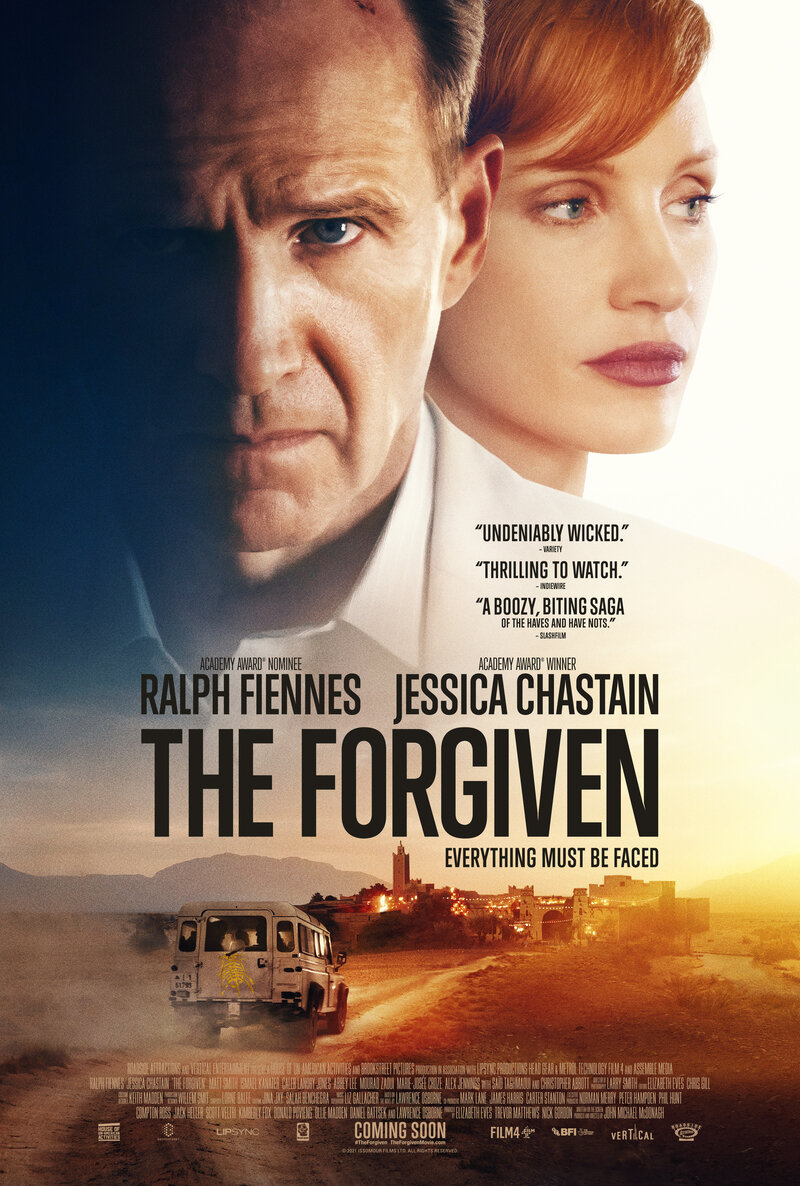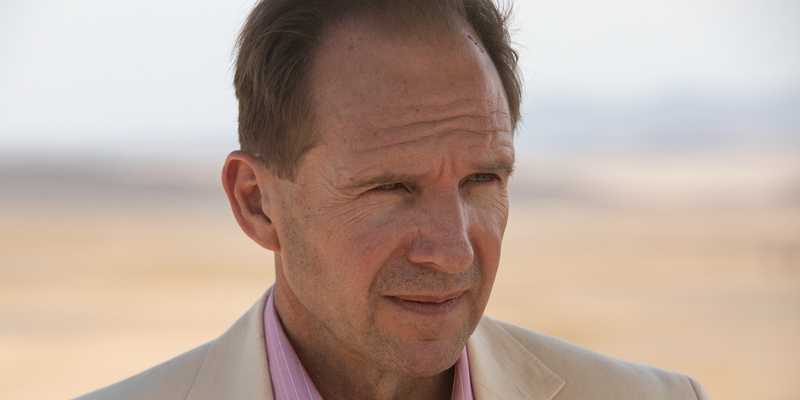
Review by
Eric Hillis
Directed by: John Michael McDonagh
Starring: Ralph Fiennes, Jessica Chastain, Matt Smith, Ismael Kanater, Caleb Landry
Jones, Abbey Lee, Saïd Taghmaoui, Christopher Abbott

Writer/director John Michael McDonagh is known for a
particularly ugly brand of misanthropy. In his previous films – the
Irish set duo of The Guard and
Calvary, and his truly obnoxious US debut
War on Everyone
– he appears to set out to attack authority figures like the police and
the church, but ends up punching down, his movies filled with crude
homophobic, racist and ableist gags. When I heard the premise of his
latest, The Forgiven, I prepared for the worst. But while some of McDonagh's worst
tendencies are still present, The Forgiven is easily his
most mature work, elevated by one of Ralph Fiennes' best
performances in many a year.
Adapted from a novel by Lawrence Osborne (which might go some
way to explaining the leap in quality here compared to previous McDonagh
works), The Forgiven sees Fiennes play David Henninger, a
"highly functioning alcoholic" doctor who travels to Morocco with his
younger wife, children's author Jo (Jessica Chastain), to attend
a lavish party thrown by British toff Richard (Matt Smith) and
his American lover Dally (Caleb Landry Jones). While driving to
Richard's out of the way mansion in the desert, the drunk David hits and
kills a young local boy who steps into the path of his car.

The immediate followup is almost identical to the recent Polish drama
Silent Land, with the local police happy to dismiss the event for fear of
dissuading future tourists. Assuming he's off the hook, the seemingly
unremorseful David sets about enjoying himself. But then the dead boy's
father, Abdellah (Ismael Kanater), shows up. Intiially believing
he might be able to pay him off, David is coerced into returning with
Abdellah to his village to help with the boy's funeral. Unsure of
whether he'll return in one piece, David sets off while Jo stays behind
to begin a brief affair with a handsome American guest (Christopher Abbott).
McDonagh's film splits into two subplots at this point, one following
David's journey towards an uncertain faith, the other displaying the
decadence of those remaining at Richard's party. The latter often feels
like a distraction, as McDonagh fails to provide any novel insights into
the lives of the rich and famous. It's the second movie in a row in
which McDonagh has used the image of two men sharing a bed as a means of
signifying depravity, and the manner in which Richard's guests speak
about non-white people and those less financially fortunate than
themselves come off as the product of lazy screenwriting rather than any
realistic dialogue. So rich westerners don’t care much for respecting
the traditions of the places they choose to locate their parties? That's
hardly a revelation, nor is it a trait exclusive to the wealthy (witness
the behaviour of travelling football fans).

Far more interesting is the David subplot, a morality play that's
crudely fashioned by McDonagh but given texture by the wonderful
performances of Fiennes, Kanater and Saïd Taghmaoui as an English
speaking local whose laissez faire attitude to the whole thing provides
some much needed comic relief. Initially finding David with a drink in
his hand beside his boy's corpse, Abdellah has no respect for the
Englishman and David does nothing to change this. Try as he might, David
keeps digging his own potential grave by saying the wrong thing or being
caught laughing at a joke in the grieving father's presence. But as it
becomes clear that Abdellah possesses a degree of compassion and honour
David long left behind, David begins to feel the guilt that should have
struck him immediately upon killing the former's son. This isn't so much
a story of a bad man becoming a good man, but rather of a bad man
accepting that he's a bad man.
As with his previous films, McDonagh's attempt to critique the powerful
inadvertently leads to him punching down. We're supposed to frown at how
David initially speaks about Arabs, but the film itself plays into tired
stereotypes, with close-ups of angry Arab men accompanied by ominous
music of the type you might find in an Indiana Jones movie.

While McDonagh's worst proclivities are still on display, avoiding his
latest would do a grave disservice to Fiennes, Kanater and Taghmaoui,
whose rescuing of the film from their director is almost conspiratorial.
Few words are spoken between Fiennes and Kanater, but there's an
indefinable chemistry between them as they portray two men broken by the
same incident.
In its best moments, when the camera settles down to focus on these
three men, The Forgiven suggests that there may well be a
mature filmmaker inside McDonagh. Perhaps if a bunch of Arab men took
him out to the desert for a few days he might return newly
enlightened?

The Forgiven is on UK/ROI VOD now.

